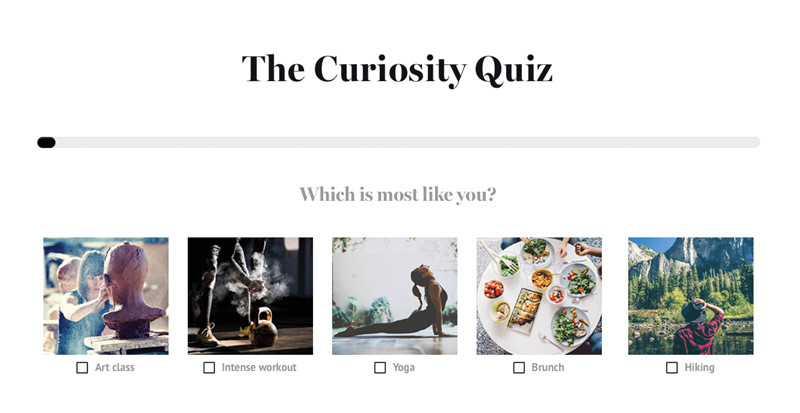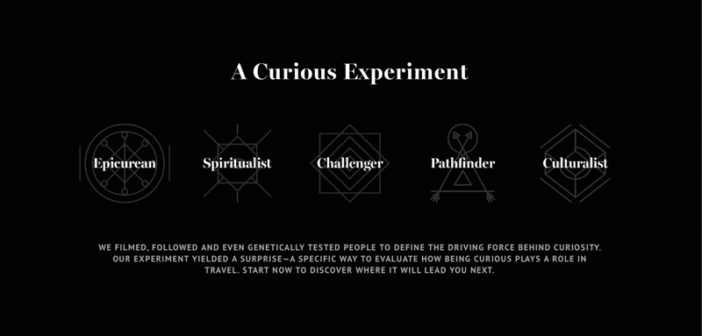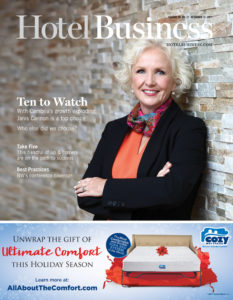MCLEAN, VA—What creates the desire to travel? Is it purely escapism, a need for stimulation or curiosity about other cultures—or something else entirely? It might be an innate motivation, or some would say, it’s in our genes.
According to the National Center for Biotechnology Information, the DRD4-7R gene—also known as dopamine receptor D4—is associated with the “personality trait of novelty seeking.” Curio Collection by Hilton wants to know what makes people crave travel, and through science-backed research methods and a new marketing campaign, it will share the results and, ultimately, generate engagement among travelers.
“Curio Collection by Hilton was interested in gaining valuable insight on its target: the curious traveler. Rather than looking at the age, income and marital status of its audience, we focused on exploring the mindset of these individuals by investing in advertising that would be interactive and spread through word of mouth,” said Stuart Foster, VP, global brand marketing, Curio Collection by Hilton.
Foster further explained, “This fall, we launched ‘The Curious Gene’ campaign to engage consumers, by partnering with a group of travel enthusiasts/influencers to discover what drives their desire to seek new experiences. From the ‘Epicureans’ who hit the road to taste the local dish of a destination to the ‘Pathfinders’ who crave outdoor adventures, these influencers partnered with us to support a paid social media campaign—all paired with a sponsored content piece from Mashable.”
For this campaign, the brand is paying the closest attention to the depth of engagement—comments and shares more than likes, for example. It is also exploring how people interact with its website and booking portal after taking the quiz.
“Ultimately, as a newer, growing brand that aims to provide travelers with an authentic experience, the most important high-level indicator for this campaign is how the marketing is affecting people’s awareness and perception of the brand itself,” said Foster.
Curio worked with a scientific laboratory to facilitate the DNA testing of approximately 30 travel enthusiasts and social media influencers, to determine if they have the DRD4-7R gene. “We also worked with research partners to conduct a qualitative study of our influencers to discover what drives them to seek new experiences to uncover five unique curiosity types,” said Foster.
The results grabbed the Curio team’s attention. Nearly 40% of those who took the quiz are “Culturalists,” which the brand defines as a person who is passionate about art, where travel is about style and openness to possibilities. In the findings, the second most common type is “Pathfinder” at 31%. This group enjoys activities such as hiking and escaping from city lights—their travel style is spontaneous and rustic, noted Foster. “Epicureans” are the food enthusiasts, coming in at 15%, followed by “Spiritualists” at 9%—those who prioritize wellness in their travels such as yoga retreats. And last was the “Challenger” type at 7%, which is represented by those whose travel approach may be described as active and exotic.
“The quiz has drummed up excitement across our hotels, and we’re looking at ways to expand bringing ‘The Curious Gene’ program to life on-property. We have distributed cocktail napkins pointing bar-goers to the quiz to encourage them to put their curiosity to the test,” he said.

Hilton’s Curiosity Quiz attempts to define types of guests and identify which hotel suits them best.
Curio’s consumer research has shown that people are seeking unique experiences as an integral aspect of their travel. “In previous years, we would have focused on straight demographics, such as age and income to identify our target traveler. Now, we consider mindset, which led us to come up with our target traveler,” he said. “To develop the quiz, resulting from the DNA testing and qualitative study of our travel enthusiasts, a typing tool was developed in order to build an interactive, sharable quiz for everyone to discover their curiosity type, which offers up a variety of Curio Collection by Hilton hotels to visit based on the five curiosity types.”
The brand’s research methods consisted of an initial screener, online board discussions and genetic swab testing with the influencers. By using the findings from this research and existing scientific information on the behaviors associated with the curious gene, an algorithm was created to classify curiosity into the five different types, explained Foster.
“We then held live observational interviews to examine five select influencers’ attitudes, beliefs and behaviors—who tested positive for the DRD4-7R gene—and created a typing tool to build the curiosity quiz,” he said. “Backed by science and our qualitative research, the sharable quiz is meant to be a fun and engaging way for all people to explore their curiosity and receive recommendations of various hotels across the collection that fit their interests.”
The “Are You Curious?” quiz is meant to be shared on Instagram, Twitter and Facebook and, for this integrated campaign, the brand made a significant investment in paid social to promote it and draw people to engage with Curio Collection by Hilton by sharing their own curiosity type through the quiz.
“The multipronged approach included the launch of our 60-second video on the day of campaign kick-off, Sept. 28, along with additional support behind social media with a 30-second video pushing viewers to the ‘Are You Curious?’ quiz. Three 15-second videos have also recently been used to showcase a few of the curiosity types and were distributed through Facebook, Instagram and Twitter since the launch, pushing viewers to the quiz as well,” he said. “With the quiz live for over two months now, we’ve had excellent response so far with nearly 24,000 completions for the quiz, more than three million video views across social media and more than 55,100 social media engagements with campaign content.”
Knowledge is power and provides valuable information to spur action. The brand’s process confirms what hoteliers are understanding more and more: Travelers are seeking authentic and local experiences. Now, it’s just a matter of finding ways to cater to these interests.
“We can harness this insight to not only get to know our guests better, but to more adeptly customize and recommend one-of-a-kind discoveries to our guests to enhance their entire experience—from planning the perfect trip to actually visiting a property and discovering activities, amenities and services that suit their curiosity type and interests,” he concluded. HB


